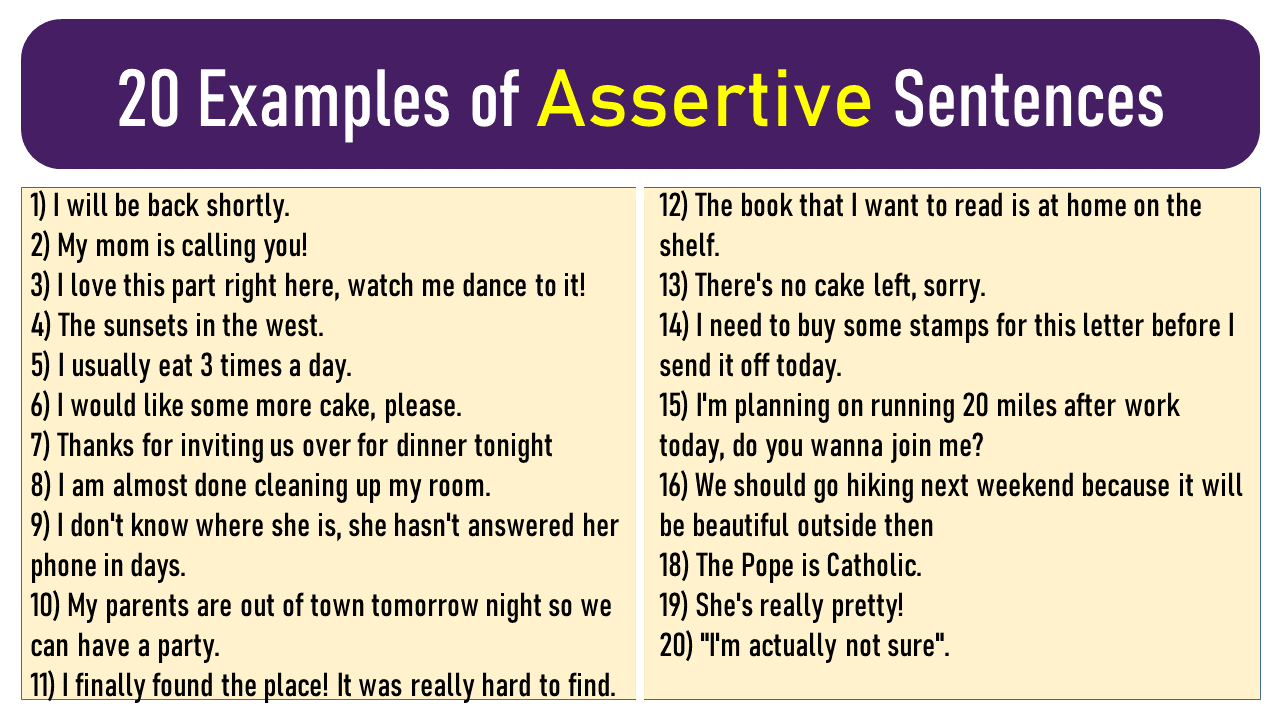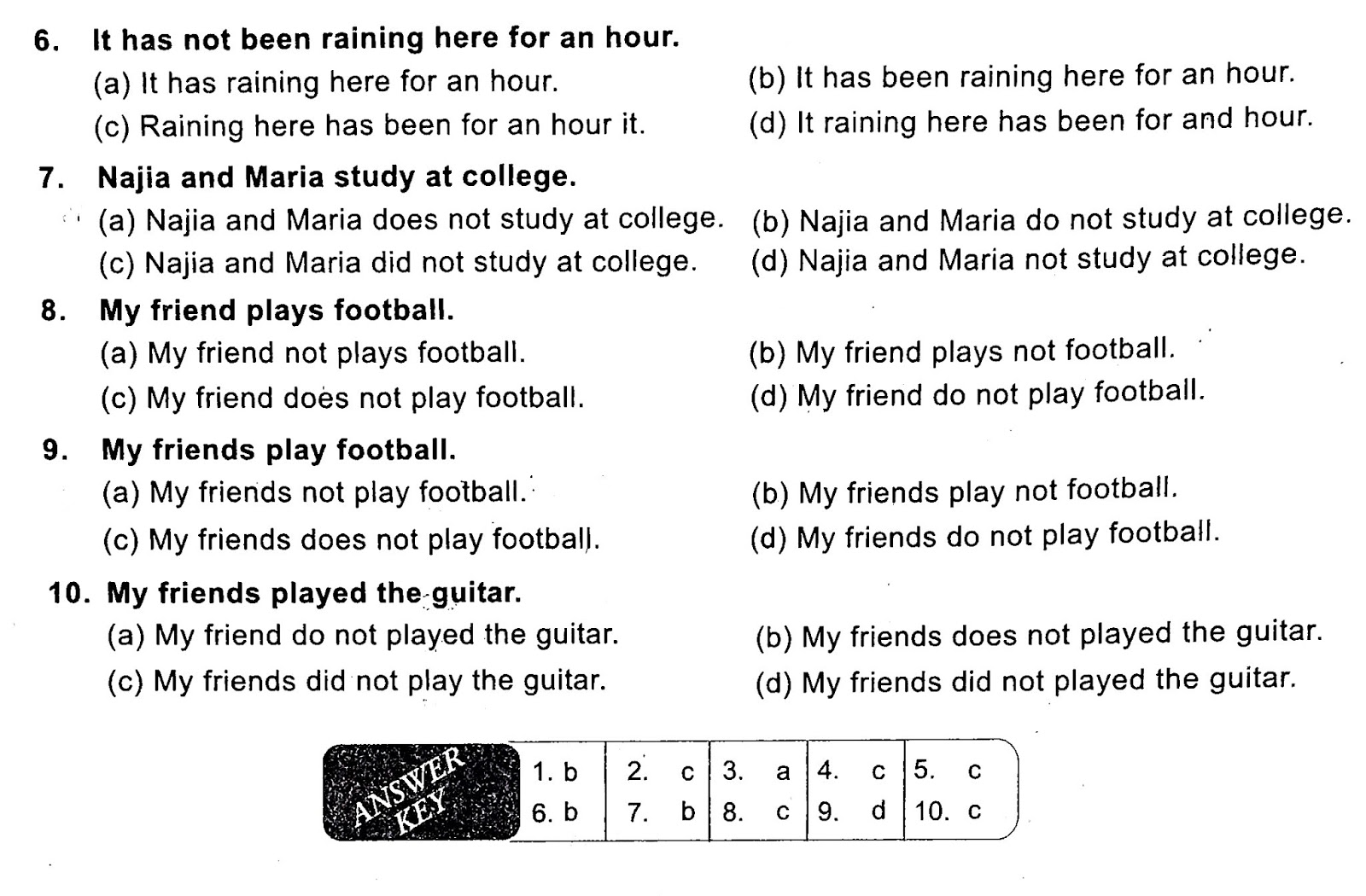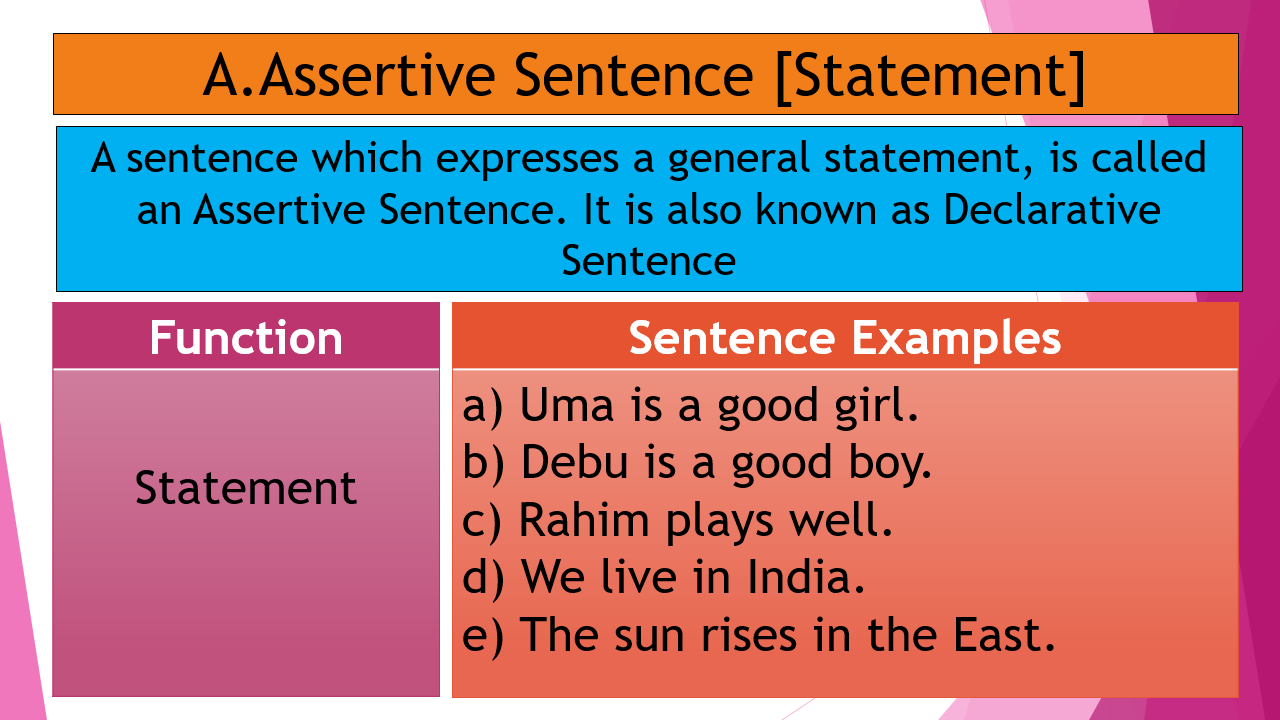Difference Between Affirmative and Assertive Sentences

Change the sentence assertive to negative. Brainly.in
Assertive sentences make general statement. Assertive sentences always end with full stop . ' Say',' 'tell', are usually used as reporting verb in assertive sentence. And they generally remains unchanged in indirect speech. Say to changes to tell. Words like ' not', 'never ' is used in case of negative assertive sentence.

Opposite Of Assertive, Antonyms Of Assertive, Meaning And, 55 OFF
An assertive sentence, also known as a declarative sentence, is a type of sentence that makes a statement or conveys information. It is one of the four main types of sentences in English grammar, alongside interrogative, imperative, and exclamatory sentences. Examples of assertive sentences based on positive, negative, and interrogative sentences.

Basic English GrammarAssertive SentenceAffirmative & Negative Sentence e YouTube
The Oxford Learner's Dictionary defines a negative sentence as a "statement that means 'no'; an act of refusing to do something or of denying something", and according to the Cambridge Dictionary, "a negative sentence or phrase is one that contains a word such as "not", "no", "never", or "nothing".

English Negative Sentences Examples, 10 Negative Sentences in English She will not be watching T
What are the kinds of sentences? Depending on sense sentences are divided into five groups. They are - assertive sentence, imperative sentence, interrogative sentence, exclamatory sentence and optative sentence. In the basis of affirmation& negation sentences are of two kinds. These are - Affirmative & Negative. Assertive Sentence:

Download Free PDF! Assertive Language Poster Teachers, Parents Can Use with Students, Children
However, assertive sentences can further be divided into two categories; affirmative and negative assertive sentences. 1. Affirmative assertive sentences. Affirmative assertive sentences make statements with an affirmative group of words. They are a group of words that state something in a positive sense. For example;

20 Examples of Assertive or Declarative Sentence »
A sentence whose only function is to state something is known as an Assertive sentence. In other words, this type of sentence declares or asserts something to the listener or reader. They usually end with a full stop (.). In this post, you will find the top 100+ Examples of Assertive Sentences. Examples of Assertive Sentence Type #1 Affirmative

Pin on Angielski
How is Negative Assertion Useful? If you act defensively when people offer truthful criticism of you then through your defensiveness or denial you may fuel further prolonged criticism from the other person or prompt another unhelpful reaction from them.

English Study Here
Assertive sentences are also called Declarative sentences. Let us see the Affirmative and Negative forms of Assertive Sentences: Structure: Subject+ Verb+ Object 20 Examples of Assertive Sentences Let us see some examples of Assertive Sentences: I know this person very well. We are arranging a picnic. You have missed this opportunity.

English grammar Assertive sentence and Negative sentence YouTube
Sentences come in four sorts in English. They can be: Statements: He saw a unicorn (positive) He didn't see a unicorn (negative) Questions: Did he see a unicorn? (positive) Didn't he see a unicorn? (negative) Commands: Look at the unicorn (positive) Don't look at the unicorn (negative) Exclamations: What a beautiful unicorn! (only positive allowed)

️Interrogative And Negative Sentences Worksheets Free Download Goodimg.co
Assertive communication is specified as " the ability to speak and interact in a manner that considers and respects the rights and opinions of others while also standing up for your rights, needs, and personal boundaries " (Pipas & Jaradat, 2010, p. 649).

Education Is The Key To Success English Grammar Assertive, Negative And Interrogative
The term "Assertive Sentence" refers to a sentence stating a truth or a proposition without equivocation. This article will examine Assertive Sentences of both their affirmative and negative types. What is an Assertive Sentence? An assertive sentence is a declaration of the claim. The word "assertive" alone conveys the message of the statement.

10 Sentences of Simple Present, Simple Past & Simple Future English sentences, Sentence
Assertive communication is a form of communication in which an individual expresses their feelings and personal needs in a direct but respectful manner [].Researchers have linked assertiveness in communication to improved outcomes in everything from the educational success of elementary school children to the job satisfaction of professional nurses [2,3].

Detailed Conjunctions List in English English Grammar Here Simple past tense, English
In simple words, an assertive sentence tells us to assert something like an idea, judgment, incident, and others. You can make its sentence by telling about someone's personality in a positive and negative way. These are simple sentences to state an event.

Write the Negative and Interrogative Form of the Following Sentences
Assertiveness can help you control stress and anger and improve coping skills. Recognize and learn assertive behavior and communication. By Mayo Clinic Staff Being assertive is a core communication skill. Assertiveness can help you express yourself effectively and stand up for your point of view.

Put The Sentences Into The Interrogative Form EDUCA
15th October 2023 What is an Assertive sentence? An assertive sentence is a statement of the assertion. The meaning of the assertive sentence is in its name itself. Table of Contents What is an Assertive sentence? Definition of an assertive sentence Assertive sentence example 10 Examples of assertive sentence

Different kinds of Sentence [Sentences Based on Function & Polarity/Meaning] » Lighthouse Edulight
An assertive sentence is a sentence that conveys the speaker's opinion, makes requests, gives information, or makes statements about what they believe to be true. Assertive sentences are not aggressive or passive; they're often quite neutral. But they convey a strong attitude and tone.